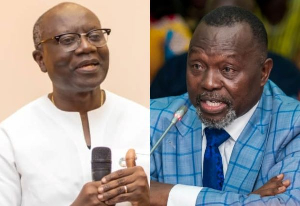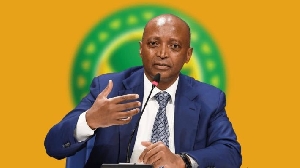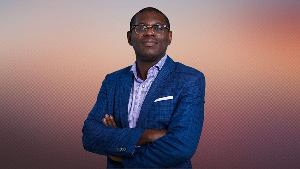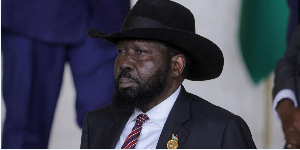The NPP cabinet’s decision on the study of English at all levels in the school system is very troublesome. But what is more disturbing is the government’s impetuous decree making the “study and speaking of French language in all first cycle institutions in the country” in addition to English (Ghanaweb, 20th June 2002).
This decree raises critical concerns about the politics of language, especially as it pertains to France’s quest for economic and cultural hegemony in the West African region. Early in the year, the president of Alliance Francaise, Ms. Anna Bossman, made a ludicrous call suggesting that Ghanaians should “learn French in addition to English.”
In August 2001, I met an NPP parliamentarian in a friend’s house in Philadelphia, who shocked some of us with his regret for not learning French in secondary school. To surprise us further, he expressed his admiration for Nana Akuffo-Addo’s “mastery” of the French language. What about Hausa, Ewe, Ga-Adangme, or Dagbani? I asked.
In fact, what makes this pronouncement irresponsible is the government’s total disregard for the pending recommendation of the president’s Education Review Committee on the question of the medium of instruction in the school system. Judging from the socio-economic hardships faced by the people in the country, the rush by Kufour's government to impose French in addition to English in the school system is thus absurd. It is also out of sync with the objective as regards the establishment of Alliance Francaise in the colonies. Explaining its purpose, the French Foreign Minister at the time, Eugene Etienne stated that the extension of French language into the colonies was “a measure of national defense.” Its founder, Pierre Foncin, added that “it is necessary to attach the colonies to the metropole by a very solid psychological bonds, against the day when their progressive emancipation ends in a form of federation as is probable, that they be and they remain French in language, thought and spirit.” This is true with all European languages imposed on us during colonialism. This brings us to the question of the nature and meaning of language.
Briefly, language is a regularized code agreed upon by a community of speakers. It is both a mode of communication and bearer of culture. Language is the product of human beings communicating with one another; and communication between people is also the basis and process of evolving culture. Language thus serves as the collective memory of a people’s historical and cultural experiences (Nugugi wa Thiongo’s Decolonising the Mind). Also, it is through language that we first acquire our consciousness; hence, it is inseparable from thought. A people’s worldview, that is, social ideas, concept of the universe, belief systems, notion of beauty, value system and material reality, manifest themselves in language. In effect, language is the essential instrument of social cohesion as well as constituent of cultural personality.
Like all languages, English and French are products of history and culture; they emerged out of different circumstances and environments quite remote from Africa. Despite the Greco-Latin roots as regards some of its vocabularies, English is primarily a Germanic language. French, on the other hand, is a Romance language. Hence, these two European languages do not possess the equivalent historical experiences to define our human culture.
What, for instance, is the place of concepts like tribe, family, great uncle, cousin, fetish, pagan, she, he, and “queen mother,” in African or Ghanaian languages? What does “taking showers” mean to the Ghanaian child who has to walk to a stream to wash up his/her body or fetch some water at a dried stream to bathe before going to school? What should a Ghanaian child be saddled with the difference between dinner and supper while he/she eats sitting on the floor, squatting or does not often eat before going to bed? While attending elementary schools at Osiem and Tafo in Akyem Abuakwa, I did not understand why I always received a zero mark for writing that “we sleep on beds;” I slept on mats from childhood through adolescence. In contrast, sleeping in bed in Europe makes sense because of their climatic conditions.
Therefore, in view of the differences between European and African worldviews, why should a Ghanaian child living in a remote area of Ghana be made to absorb the weight of both English and France’s historical and cultural experiences, at the expense of those which his/her ancestors laboured so hard to create? Why should a Ghanaian child be forced to study foreign languages as a means of instruction from kindergarten, rather than as subjects to be studied at an appropriate level? Why should a Ghanaian child be made to study the additional French (foreign) language, when in fact, she/he is still struggling with the English language, formally imposed on her/his ancestors in 1884?
Our great thinkers, past and present, have addressed these concerns by advocating and/or working towards the rebirth of our cultural personality through the study of our African languages. Their views clearly showed the extinction of our cultural humanity if appropriate measures were not taken to restore our languages in our national life.
In 1911, J. E. Casely Hayford, the first president of the National Congress of British West Africa, recommended an African language the medium of instruction in sciences, humanities, engineering, medicine etc. of a national university, and whose function, among other things, was to correct the erroneous ideas written about Africa. He and John Mensah Sarbah saw the peril of our “deAfricanization by means of Western methods of education,” and urged that “the young should be trained on a vernacular basis and turned out” to be men of nation builders. Kwegyr Aggrey, in his response as to when an African language should be used in education said the following: “ my answer is, from the very beginning.” In one of the recommendations contained in the memorandum preceding the 1919 Pan-African Congress in Paris, W.E.B. Du Bois emphasized the “right of every (African) child to learn to read and write in his language.”
Kobina Sekyi, the last president of the Aborigines Rights Protection Society strongly advocated against things European, including language. A manifestation of his opposition to European culture and the English language in our national life can be found in his 1915 play, “The Blinkards.” He wrote this play in Fanti to ridicule and to berate the abrofosem class in their blind copying of European culture.
Speaking to the House immediately following Ghana’s independence, Kwame Nkrumah saw the place of European languages as “the influence of Europe in our affairs…Far more students in our universities,” he said, “are studying Latin and Greek than studying the languages of Africa.” Thus, “an essential of independence is that emphasis must be laid on studying the living languages of Africa for, out of such a study will come simpler methods by which those in one part of Africa may learn the languages of those in all other parts.”
In May 1962, Nkrumah decreed that a pass in English was no longer necessary for obtaining the School Certificate. Prior to this, a failure in English constituted a failure in the final School Certificate examination, regardless of outstanding grades a student might have obtained in all other subjects written in English.
J. B. Danquah also understood language as the linguistic channel of life when he wrote two of his plays in Twi, “Nyankosem” and “Osei Tutu.” The story of Ephriam Emu is well known. On his return from Britain, he became impatient with what he saw as inappropriate European cultural accretion on our people, and devoted the rest of his life to the renascence of African traditions, customs and language. He wrote his classical African music in both Twi and Ewe, and felt more comfortable speaking these two languages than English.
Saka Acquaye went further to postulate that “it takes the Ghanaian about twenty years of his most impressionable years to get to understand Western culture, in an effort to secure a position for material needs.” And that “it is not easy to find any Ghanaian who can express himself well in English who has not lost something of his (African) personality.” Next is Efua Sutherland, who once deplored and characterized the practice of presenting children on television to express themselves in English as torturing. In 1965, she called for a bold action towards an “Akan or another major Ghanaian language" as the vehicle for theater making in the country. Professor Kofi Anyidoho, head of the English Department at Legon, once told me that the issue was not debatable, yet some ”educated” citizens, perhaps out of their affinity to all things European, would present incoherent arguments against the need for an authentic national language.
The question is, what percentage of Ghanaians recognizes English as their lingua franca? How many Ghanaians can really explain their ailments to medical doctors in English? Given the distinction between expressing oneself in a foreign language and speaking it, how many parliamentarians actually speak the English language? What we speak is, in fact, a textbook English. Speaking it involves the free flow of nuisances, wisecracks, aphorism and sound culture imbedded in the language, without transposing our African thoughts into English. For, the African linguistic rules, lexicons and sound culture used in expressing our thoughts in the English language, via transposition, do not synchronize or correspond with our African cultural personality. This explains why the newsreaders on television read the scripts, but do not communicate any passion to the viewers. And the so-called broken English spoken (not the written one) by university students is precisely because of the problem of transposition. Their newly found language becomes a unique denominator, the characteristics of African cultural personality and identity par excellence. So, if after hundreds of years, the so-called “lingua franca” English language has failed to foster a social cohesion among the citizens of Ghana, what can French, another European language, do? Therefore, slamming “a ban on the use of Twi at all offices in Adansi West District in the Asante region” by the former NDC District Executive, Mr. Michael Essandor on April 10, 1999 was an extreme form of insanity. For him, the use of Twi in the offices was not “facilitating effective management." What Nonsense! The argument put forth by the cabinet and some of the elected officials that using English as the medium of instruction at an early age facilitates mastery of the language towards successful performance in the schools and during examinations, is simplistic and childish. R. S Rattary did not study Twi until he came to the Gold Coast, yet was able to study Twi within a very short period in order to research and write his seminal books on Asante culture. In contrast, some young Ghanaian graduates and students that I have come across , both in Ghana and the US, find it very difficult to make one complete sentence in a Ghanaian language. Some of them went to school in Ghana, yet they cannot speak any Ghanaian language at all. And the sad thing is that, most Ghanaian couples from the same village/town or ethnicity, that I have come across in the US, speak English only to their children. This practice also goes on in some Ghanaian homes in Ghana. In view of this, who is going to conduct research and produce scholarly works on African human sciences in the future? Those white students who have seriously taken to the study of African languages, including Akan, Ga-Adangme and Ewe, at major universities in Europe and the US? Hypothetically speaking, if this becomes a reality in the future and the current NPP government and other simple-minded Ghanaians found themselves in the underworld, what would they tell the ancestors (Saka Acquaye excluded) cited above? “I beg your pardon?” On December 26, 1998, The Chronicle published an article in which Dr. Gabriel Gyan sided with one I.K Gyasi questioning Professor Dolphyne and Dr. Boateng for suggesting “the need for the adoption of one Ghanaian language as a national or official language.” If not from Professor Dolphyne, the renowned African scholar in linguistics, then from whom? Quality education has nothing to do with the “mastery” of English or French; quality education has to do with good nutrition, qualified teachers with high morale, library and books, material resources, parents’ participation, good structures, healthy/safe environment, good health and realistic curriculum. This is the difference between the preparatory schools and the so-called “sato” schools, which I attended. The fact is that, those who send their children to preparatory schools still employ additional teachers to teach and prepare them in their homes towards the GCE or the BECE examinations. But if you go to Ettokrom in Nana Akuffo-Addo’s constituency, none of the JSS students has ever qualified for SSS. Like most “sato” schools in the country, the resources one finds in the preparatory schools are simply not available at Ettokrom Primary and JSS. Most of the teachers live out of town, and sometimes they arrive very late to teach. And if their poor monthly income also dries up in a week’s time, how do we expect them to show up. Clearly, this downward trend in terms of turning death ear to language as the workings of culture can be attributed to the ambivalence of Ghana’s cultural policy. And the lawmakers responsible for shaping the country’s cultural policy spend countless hours debating about concepts like “housewife,” that hold no ground in the society. Some of them naively associate the so-called mastery of European languages with intelligence and common sense. In their minds, defining or shaping our identity in the image of Europe and the boundaries laid out by the European capitalists at the Berlin Conference in 1884 makes us civilized. This probably explains why President Kufour could not have the political will to say NO to the French language attached to the so-called aid? And if what the president can show for his visits to Togo and France is his agreement with the French government on the study and learning of French as a second national in Ghana, then we should brace ourselves for a worse form of neocolonialism. This lack of self-determination also explains why the “leaders” of our tax collecting governments, after Nkrumah, trek around the world, in light of abundance of well-bred human capital and natural resources, begging on their knees for crumbs to solve our socio-economic chaos. In effect, it is this perpetual neocolonial status of Ghana as well as the denial of our distinctive African personality by successive governments, after the infamous military overthrow of the CPP government, which exposes us as the most confused people on this planet. In conclusion, I will let the wisdom of two distinguished African scholars speak for themselves. Expressing his regret about studying French in school, one of the most renowned African scholars in French, Albert Te’voedjire had this to say: “ I regret the fact that I was obliged to learn French first, to think in French, to remain ignorant of my mother tongue…I will always deplore the fact that I was forced to become a stranger in my own country.” There is no doubt that we need, for the time being, the English language for communicating with the outside world and for gaining access to Western scientific and technological knowledge, but as Professor Emeritus J. H. Nketia said : we certainly need our own languages for access to African civilization and humanism, to the treasures of the African past in which we can rediscover our identity, our spiritual awareness, our sense of pride and our dignity..overshadowed in the colonial past...These languages were used not only for ordinary social intercourse but also for entertainment, for judicial purposes and for the rituals and ceremonials that characterized the African way of life
That is to say, “as long as a conquered people has not lost its language, it can have hope,” Montesquieu said some years back.
507 W. Manheim St., Bldg. 11A
Philadelphia, PA 19144

Views expressed by the author(s) do not necessarily reflect those of Ghanaweb.














